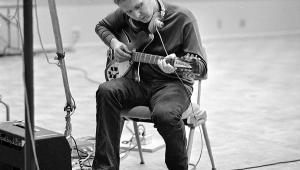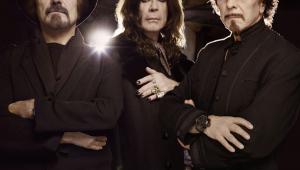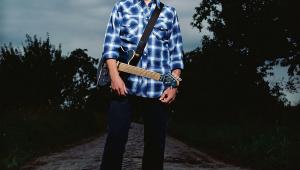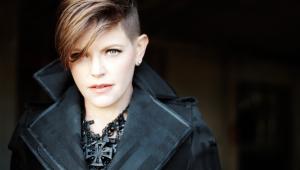This Week in Music, March 5, 2013: Replacements reunion, Hendrix exhumation Page 2
Son Volt: Honky Tonk
New release (Rounder; tour dates)
Photo by Mark Seliger
From its album title and some of its song titles (“Down the Highway,” “Bakersfield”) to its booklet artwork (depicting the legendary Floore Country Store dancehall), the subject of this homage is outwardly unmistakable. And inside, our distinctive host is Jay Farrar, whose voice and pen — in the 18 years since Son Volt’s debut, Trace (and the 23 years since Uncle Tupelo’s No Depression) — have matured to the point where they’re eminently comfortable delivering these vignettes. There’s very little electric guitar here, appropriately giving way to mandolin, accordion, pedal steel, and twin fiddles, vividly recorded by band member Mark Spencer. “Honky tonk music is about heartache, heartbreak, the road,” Farrar says in a press release, and it’s all here in the lyrics. On one hand, “There’s more brick walls than bridges on the way to your heart.” On the other hand, “Don’t let the barricades of life keep the wild spirit still.” What else is there to say except: Finish that beer and find a dance partner.
Madeleine Peyroux: The Blue Room
New release (EmArcy/Decca; tour dates)
Photo by Rocky Schenck
This is one of the richest tributes I’ve heard in some time. Initially, jazz singer Madeleine Peyroux and her producer/arranger Larry Klein planned to interpret songs from Ray Charles’s two 1962 volumes of Modern Sounds in Country and Western Music. And that they do, beautifully, on five selections here, including a deliciously slowed-down “Bye Bye Love.” But the remaining five tracks are from other sources (Buddy Holly and Randy Newman among them), and they complement the Charles numbers perfectly. Throughout, Peyroux’s sweet-but-knowing voice sounds ideal in this oh-so-blue room. Strings on seven tracks have an admirably light touch, and there are some fine solo-instrument turns, from Dean Parks’s deft electric-guitar work on “Take These Chains from My Heart” to John Sneider’s trumpet snippet on “You Don’t Know Me.” All told, the best track may be the last one: Warren Zevon’s “Desperados Under the Eaves,” where Peyroux gives a supreme poignancy to that closing air-conditioner hum.
Robyn Hitchcock: Love from London
New release (Yep Roc; tour dates)
Photo by Michèle Noach
According to Robyn Hitchcock himself, Love from London “celebrates life in a culture imperiled by economic and environmental collapse. We are surfing on the momentum of chaos.” This, then, is some troubled celebration, seeping especially effectively into the mournful piano of the opening “Harry’s Song.” The next few tracks catch a nice wave, amiably advising in the guitar-and-cello strummer “Be Still” to “let the darkness fall upon you” and serving up some murky psychedelia in “I Love You.” But then there’s a rut, and checking the credits you realize there’s no human drummer here; rather, the album is dominated by the bass-heavy, mechanical sound of producer/engineer/multi-instrumentalist Paul Noble. It closes better with a lament (“My Rain”) and a midtempo pop tune (“End of Time”). The latter, though, is nearly ruined by its monolithic drum track — and overall, this is a disappointing set, coming on the heels of Hitchcock’s organic albums with the Venus 3.
Caitlin Rose: The Stand-In
New release (ATO; tour dates)
Photo by Melissa Madison Fuller
Whether leaning on a pool table in that publicity shot above, giving a come-hither look on her album cover, or having a drink and a smoke on the CD package’s inner gatefold, singer/songwriter Caitlin Rose’s current optics are all about the rougher side of a modern Nashville singer’s life. Granted, the follow-up to her acclaimed 2010 full-length debut, Own Side Now, opens with a Rolling Stones clarion call on guitar, and tracks like “Only a Clown” (one of two written with the Jayhawks’ Gary Louris) and “Waitin’ ” lean nicely on the latter half of “country rock.” But Rose’s bell-clear vocals belie all of that. I’ve seen comparisons to Patsy Cline and Loretta Lynn; somehow, I mostly hear . . . the late Kirsty MacColl, another singer with a wonderfully pure voice. Accordingly, when Rose has to use the F-word in a cover of the Felice Brothers’ “Dallas,” it doesn’t ring true. Nor does the production do her any favors when the drums are jacked up (which is often). Much more fitting is the ballad “Pink Champagne,” where, recalling a Vegas wedding, one of Rose’s characters says: “Never will forget the day you turned and said to me / ‘Darlin’, it was just as lovely as I dreamed that it would be.’ ” There’s no stand-in for that breed of precise writing and singing.
- Log in or register to post comments








































































